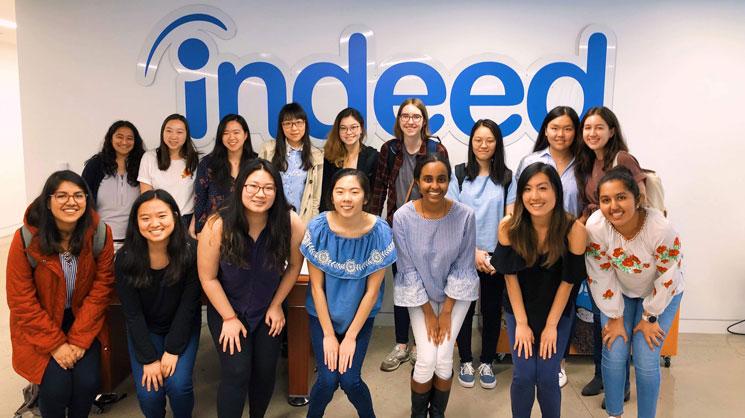Photo: CSters visit Indeed. February of 2019.
In 2001, scarcely one-fifth of the CS undergraduates were women. Fewer than 10 female CS students were scattered across the eight residential colleges and rarely saw each other outside of lectures. Some of them approached the then chair Moshe Vardi who quickly realized there was a problem. He readily agreed there was a need to facilitate stronger interactions among the undergraduate women students in CS and endowed the effort with some seed funding.
"I suggested the name CSters," said Vardi, "and launched the club in the fall of 2001. Then we got Lydia involved in early 2002."
The student club with a name that sounds like "sisters" was created for undergraduate women in computer science but has expanded to include graduate students as well.
Lydia Kavraki, one of only two female faculty members in the department, agreed to be the club sponsor and remains the only sponsor the club has known. She takes a great deal of pride in mentoring the group.
“Over the years, the club grew from 5 members to more than 150," said Kavraki. "At the beginning, I was very much hands-on, encouraging several activities. However, I quickly realized that the club had to self-organize to survive. The leadership of the club has been simply amazing over the years. A set of officers and dedicated members would establish processes and would document activities and ideas that were worth carrying over, and this information would be passed to the next set of officers who would add their own ideas and hand a better club to the next leadership.
"It has been amazing to see how much innovation has happened over the years, how independent, resourceful and creative these young women have been and what they have accomplished through the club for themselves and their fellow students.”
In addition to monthly meetings with guest speakers, the club hosts study sessions and creates opportunities for its members to explore technology industry careers. Their spring recess trek to the Domain in Austin each year includes facility tours and visits with software engineers and product managers working for several of the employers based there. For many of the first and second year CS students, the Austin trip provides their first look at women working in jobs utilizing the kinds of problem-solving and algorithm writing skills the students have been learning in their courses.
Yaxuan Wang, a third-year Ph.D. student said, "The 2019 Austin trip was my first CSters event. It was the most inspiring and meaningful event I've attended since I joined Rice as a PhD student in the Computer Science Department.
"We visited high-tech companies of different sizes and with various business models, and Rice CS alumni discussed their first-hand experience in the industry, providing feedback and other career tips to the visiting students. Each of the alumni did a great job, are clearly successful in their positions, and left us with many valuable suggestions."
Attending the Grace Hopper Celebration of Women in Computing (GHC) was one of the first activities Kavraki suggested to the club's co-founders in 2002. That fall, four Rice undergraduate women headed to Vancouver, Canada for a conference that drew 600 participants. When GHC was held in Houston in 2018, the CS department was represented by 58 undergraduate members of CSters, 38 graduate students in the department's professional master's or Ph.D. programs, and four faculty members.
For more insight into the origins of CSters, read the co-founder and early member profiles:
• Kijana Knight-Torres
• Annie Christian Klemp
• Merziyah Poonawala
• Tina Kim
Carlyn Chatfield, Alumni Relations Specialist in Computer Science

